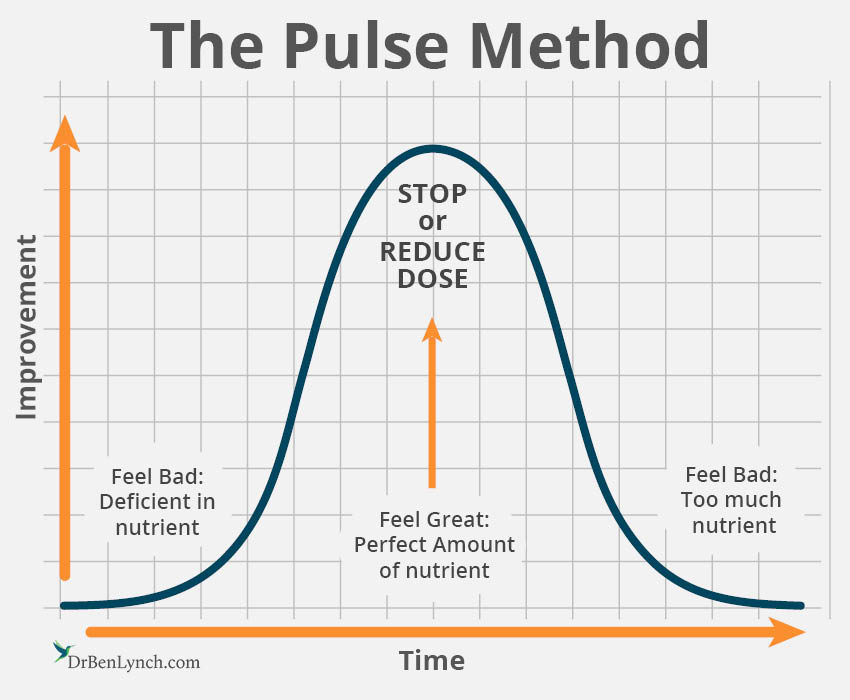The Pulse Method

A term used when speaking about supplementation that is causing some confusion is “Pulsing.” Have you heard this term and aren’t quite sure what it means? When I think of the word “pulse” I think of blood throbbing through my veins and the rhythm my heart beats on.
First Let’s Define What It Means to Supplement
Supplementation is used to “top off” nutrients you already receive daily from eating. It is also a tool to aid the body in regaining balance which can be offset due to poor food quality and lack of essential vitamins and minerals.
Supplementing is one way you can help your body get specific nutrients it might be lacking. It can be a supportive addition to your busy life but is most beneficial when done intermittently(1).
It should not be an everyday occurrence, except under certain circumstances. Once your system is full of that specific nutrient and performing at optimal levels, then the supplementation should pause, or “pulse.”
Keep in mind that what the body needs more of today might be different than what is needed tomorrow.
So What Is Pulsing and How Does It Work?
Pulsing by definition is the regular throbbing of the arteries, created by successive contractions of the heart or the rhythmic recurrence of strokes, vibrations, or undulations(2).
Think of it like waves rolling into the shore exhibiting a rising and falling motion.
Pulsing supplementation is like that, undulating the nutrients through your system. Just like the heart speeds up or slows down during times of excitement or relaxation, so should your supplementation regimen.
Pulsing means taking a vitamin when you notice deficiencies or if you feel a benefit from it.
If you feel great, or nutrient sufficient, you may not need to take that supplement on that particular day. Listen to your body and the signs it gives you.
If a supplement has been working wonders and you start to feel better, well then, perfect!
You hit your nutrient-sufficient level and you should pulse: Stop taking it until you notice signs of being deficient.
Everyone is different so the amount one person takes could be different than what the next person needs. Again, listen to your body and its symptoms.
When You’re Not Feeling Well
If you are feeling low, tired or uncommonly bad, that may be a sign that you are deficient in a nutrient needed to live life at your optimal best. That is when taking the recommended dosage is key.
Hopefully taking the vitamin brings you up to the height of the graph, pictured below.
Once at the height of the graph, then it’s time to reduce dosage or pause (pulse) on taking that certain supplement.
The Pulse Method is the method of stopping or starting the action of taking a supplement or vitamin based on individual needs.
When You Feel Great!
If you see no signs of illness or fatigue then you have the perfect amount of the nutrient and you may not want to swallow that capsule or take that liposomal.
It is best to supplement when you notice the first hint of a symptom.
That would be the time to resume your supplementation regimen and to pulse it back on!
In the case of supplementing, it is possible to over-stimulate your system and shock it into a reaction you might not like, or trigger your body to stop producing that nutrient on it’s own.
That is a sign of when you would want to pulse, or reduce, the amount of the nutrient you are taking.
The best practice is to observe your body’s reactions, pay attention to the early signs your body exhibits, and react appropriately.
You are the one in control of your health, listen to your body.
Learn what is best for you and your loved ones. It is all part of the journey toward a healthy life!
Reference:
(1) Rosner, Bryan, Julie Byers, and Michael Huckleberry. The top 10 Lyme disease treatments: defeat Lyme disease with the best of conventional and alternative medicine. South Lake Tahoe, CA: BioMed Pub. Group, 2007. Https://books.google.com/books?id=J4TFtQeHkQAC. 2007. Web. 23 Mar. 2017.
(2) http://www.dictionary.com/browse/pulsing
* This article is not intended as a substitute or replacement for the advice of a healthcare professional. Consult your healthcare professional prior to starting, stopping or making changes to your healthcare regimen.
Topics: Deficiency, Health, Nutrition, Pulsing, Supplementation, Tips & Tricks

